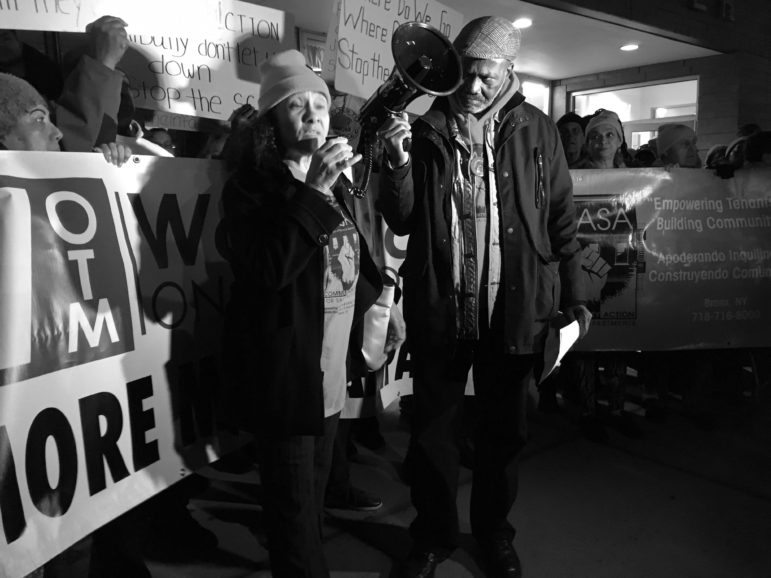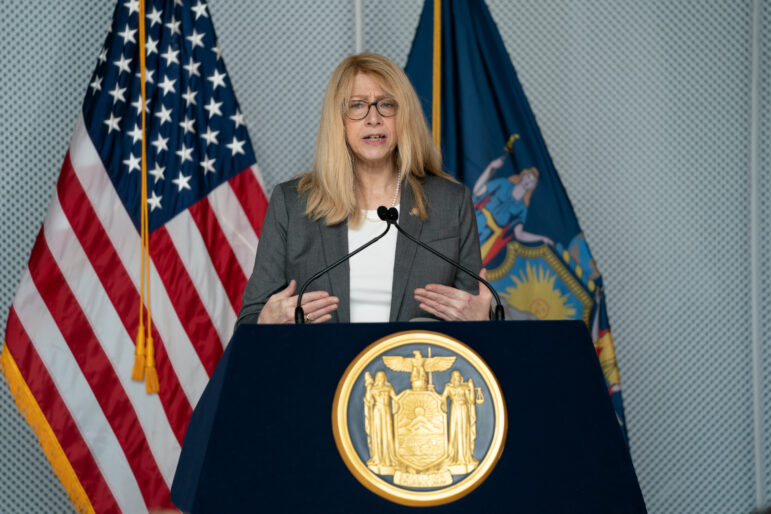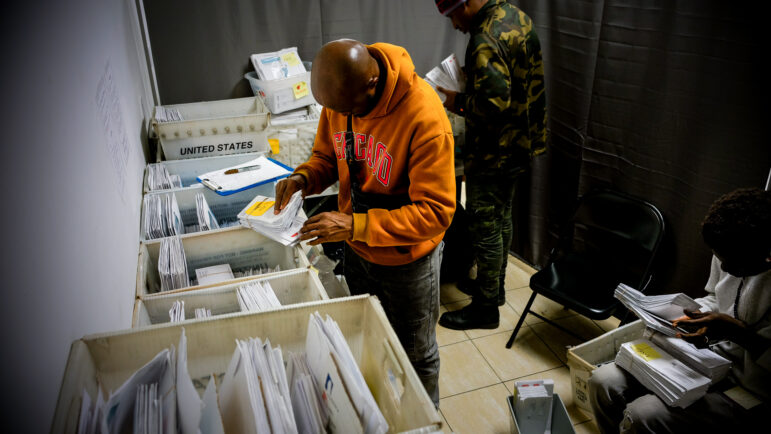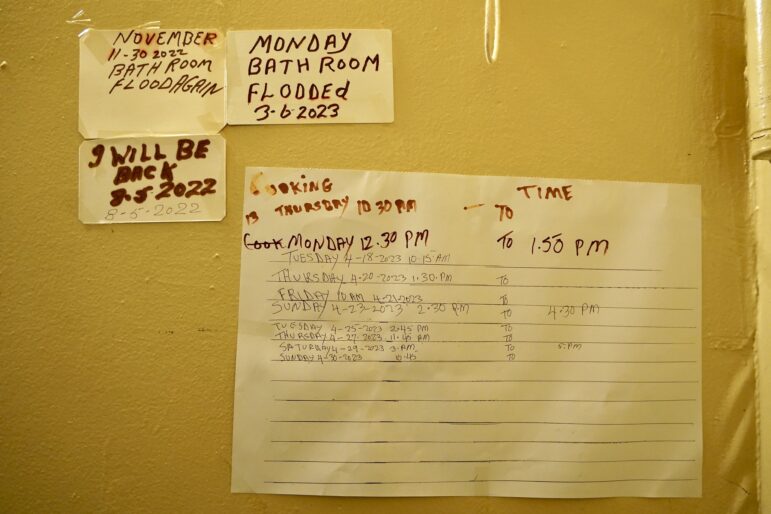
Sadef Ali Kully
Members of CASA rally outside a tenant meeting earlier this month.
On the corner of Jerome Avenue and 172nd Street, on a chilly February night, the tenants from Queens and the Bronx gathered outside the New Settlement Center to once again call on state and city officials to renew New York’s rent laws in a way that protects tenants.
It is the kind of meeting that has been held on winter evenings and spring afternoons in the Bronx and elsewhere in the city for more than two decades, as tenant advocates fought against the weakening of rent laws during the Pataki administration, and tried to achieve meaningful improvements during the early years of Gov. Cuomo’s tenure.
This year feels different. The familiar roster of wishes from tenant groups—to end vacancy decontrol and the vacancy bonus and to rein in preferential rents and the rent hikes associated with major capital improvements and individual apartment improvements—stands a chance of actually passing, given Democratic control of the state Senate.
There’s even hope for an expansion of the rent laws—which now only cover a few major cities in the state—to multifamily buildings statewide.
“When the state rent laws expire in June this year, you all will have an opportunity to not just continue what’s already there but also to build on what’s there. Working class families like mine deserve the peace of mind that they can count on their housing,” said Alexis Francisco, minister from New Day Church in the Bronx and organizer with Northwest Bronx Community and Clergy Coalition (NWBCCC). “Preferential rent is increasingly becoming a tool for harassment by landlords. Our people cannot keep up with the rising living costs here. We are here to fight and demand universal rent control.”
The NWBCCC, Community Action for Safe Apartments (CASA) and members of the Upstate Downstate Housing Alliance are part of a larger coalition known as “Housing Justice for All” pushing for stronger tenant protection laws and universal rent control.
There is a sense of urgency. “It’s important that we have everyone’s undivided attention because this is getting down to the nitty gritty with regards to our concerns about closing all the loopholes in the rent laws,” said CASA leader Carmen Vega Rivera to the dozens of residents in attended. “The roof over my head is important because I am in the process of being displaced.”
There is also a mix of optimism and doubt. The Democrats’ control of the Senate bodes well for pro-tenant action. But the real-estate lobby funded Democratic campaigns as well as Republican ones. Economic tides might be shifting, possibly cowing legislators from ambitious actions. And the sheer length of the progressive agenda in Albany means deals could be cut that leave rent regulations wanting.
Out of seven state elected officials invited to the New Settlement event, Bronx State Senator Alessandra Biaggi and state Assemblymembers Victor Pichardo and Nathalia Fernandez came and answered questions about tenant protection laws that have been introduced or will be introduced this year. The answers were the ones people in the crowd wanted to hear.
The system has been created for profit over people and this is the opportunity to close those loopholes to make sure. The fact that landlords can take tenants to court for a $50 court fee and they know tenants do not have legal representation–it is an abuse of power and privilege,” Biaggi told the crowd.
Pichardo noted that he was the prime sponsor behind bill A2351 which calls for a repeal to provisions permitting rent increases after vacancy.
With the majority we have in both houses and the expertise we have both houses …we will be working hand-in-hand to make sure we pass the best possible protections tenants have,” said Pichardo. “We hope to have a conversation with the governor to discuss these issues further.”
In January, Cuomo’s State of the State address reiterated his support for expanding tenant protection laws across the state, “This year we have the opportunity to finally reform the rent regulation program, including eliminating vacancy decontrol, ending preferential rent limits, limiting building apartment improvement charges and strengthening the tenant protection unit so we actually enforce those laws,” he said to an applause.
While it seems almost certain the rent laws will be tightened it’s less sure that the geographic reach of the laws will be expanded. But universal rent control–an obscure idea when it first gained visibility during Cynthia Nixon’s primary challenge to Cuomo– has at least become part of the mainstream policy conversation.
New York City’s Rent Stabilization Law, signed in 1974, applies to large apartment buildings built before that year in the city and three counties outside of the city’s five boroughs: Westchester, Rockland and Nassau counties. Universal rent control would eliminate those geographic restrictions.
New York State would not be the first state with universal rent control. This Tuesday, the Oregon Senate passed what would be the first such statewide system.
Last year during the gubernatorial campaign, both the Rent Stabilization Association and the Real Estate Board of New York said universal rent control would become a problem rather than a solution–that it would discourage private investment and lead to maintenance issues that hurt tenants.
Calls to adopt some new, statewide regulations are broad. Regional Affordable and Fair Housing Roundtable’s recent report, Closing the Divide: Creating Equitable, Inclusive, and Affordable Communities, in addition to endorsing changes to existing rent laws like ending vacancy decontrol, calls for passing a law imposing “just cause” eviction protections “to apply to all municipalities where rising rents threaten the housing security of families, while allowing some flexibility for more localized, unique conditions.”
The report also highlighted the need to remove exclusionary zoning and other land use barriers to affordable housing, and the creation of a statewide Housing Appeals Board to override local zoning decisions and fast-track affordable housing proposals, as well as the new concept of Vacant Apartment Acquisition Program (VAAP) where state funding would make a lump sum payment to owners of existing apartments in return for making the apartments affordable for 30 years.
But rent laws play a key role in any hope for a more sustainable future, people associated with the report—based on a year’s worth of public engagement—told City Limits.
“When we were coming up with these policy ideas—rent regulations came up pretty quickly when were looking at particularly gentrification and displacement. Many of the members honed in on what was occurring with rent regulations and with the laws sunsetting in [June 2019],” said Lorraine Collins, Director of Public Policy and External Affairs at Enterprise Community Partners’ New York Office.
Albany isn’t the only arena for tenant advocates in 2019. Late last year, the City Council introduced another 18 pieces of legislation to take tenant protections a step further—as evictions declined thanks in part to the Council’s right-to-counsel law of 2016.
Fair Housing Justice Center executive director Fred Freiberg, a member of the roundtable that produced the report, added that another issue which came up during the meetings of over 30 advocacy groups was the enforcement of regulations already on the books.
“There was unanimity—no matter what topic we got to—we would eventually find out one of the problems is the government is not enforcing from rent regulations to fair housing laws,” he said. “Generally, that was always one of the conclusions.”
Indeed, at the recent meeting off Jerome Avenue, Northwest Bronx Community and Clergy Coalition tenant organizer and advocate Nova Lucero said it was not difficult to find tenants dealing with what they say is mistreatment by a landlord. “They are scared, but they are here.”








